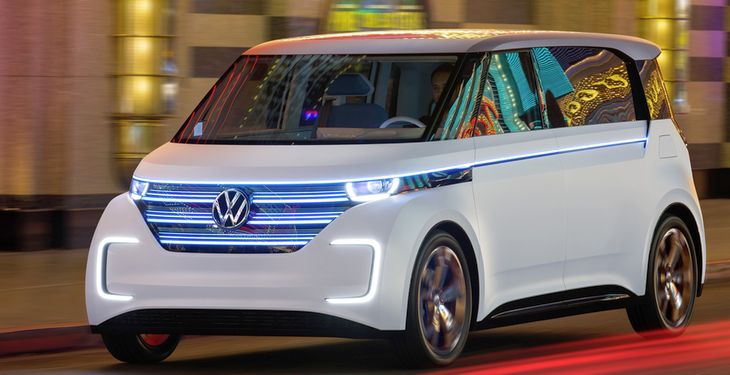Matthias Müller, the CEO of Volkswagen Aktiengesellschaft, presented “TOGETHER – Strategy 2025”, the company’s vision for the next decade. He reaffirmed that the company would invest billions over the coming years in a major “electrification initiative second to none in the industry” as well as in autonomous driving, digitalization and new business fields such as mobility services.
Müller told the shareholders that the new Group strategy will clear the way for transforming one of the world’s best carmakers into one of the world’s leading providers of sustainable mobility.
He said the Company’s “most important currency” was credibility and trust in the Group’s brands, products and “Volkswagen as a whole”, adding that it was all about regaining the trust lost as a result of the diesel issue. With reference to the current fiscal year, he added: “That does not mean, of course, that we have buried our ambition. Quite the opposite. We do not plan to make it easy for the competition.” The 60 or so innovations that the Group will be launching on the market in 2016 will play a role as well. These include vehicles like the new VW Tiguan, the Audi Q2, the new SEAT Ateca and the Porsche Panamera, “which have been extremely well received and for which we have high expectations.”
Electrification initiative with more than 30 fully electric cars by 2025
In Strategy 2025, the group is undertaking an electrification initiative that is “second to none in the industry.” Nonetheless, the combustion engine remains important: “It will be with us for some time to come and will still account for around two-thirds of the new vehicles market volumes in 2030. But that also means the other third will be electrically powered. The breakthrough for e-mobility will long be reality by then. And we are determined to make e-mobility a new hallmark of Volkswagen.”
The Volkswagen Group is going to launch over 30 fully electric new vehicles by 2025. “We expect that by then we will be selling about 2 to 3 million pure-electric automobiles a year. This will account for a significant share – an estimated 25 percent – of our total sales volume. We are stepping up our efforts accordingly and will launch a multi-billion euro investment program,“ Müller declared.
At the same time, Müller pointed out: “As far as the development of fuel cells is concerned, we intend to stay on the ball in this area too. And we will be ready when the time is ripe.”
Autonomous driving and battery technology to become core competencies
Autonomous driving is another key issue in the transformation of core business. The Company’s aspiration is to serve all relevant segments, with autonomous vehicle concepts for private transport as well as last-mile solutions for shifting people and freight in major cities. Matthias Müller went on to say: “Fully autonomous vehicles with a self-driving system developed in-house will enter the market by the beginning of the next decade. Cumulative investment in new autonomous mobility solutions will amount to several billion euros.”
A similar goal is being pursued in another initiative: establishing battery technology as one of the Volkswagen Group’s core competencies. This technology is the key to e-mobility. It accounts for 20 to 30 percent of value-added for fully electric vehicles. “We will need 150 gigawatt hours of battery capacity by 2025 for our own e-fleet alone – which would make for a massive procurement volume,” the CEO explained.
The economic importance of this issue is plain to see. And the technological expertise will certainly be a good fit with the Volkswagen Group. Müller pointed out: “We will examine in detail all strategic options for developing battery technology as a new core competency for the Volkswagen Group. In doing so, we will be scrutinizing the entire process chain – from raw material right through to battery production.”
Emissions tests to be evaluated externally by independent third parties as a general principle
The CEO outlined the lessons that will be drawn from the past for the shareholders: “We have therefore decided that emissions tests at our company will, as a general principle, be externally evaluated by independent third parties in future. Real-world random testing of vehicle emissions behavior on the road will also be introduced. I strongly believe that our industry requires more transparency, courage and openness in dealing with this issue. And this is why we firmly support political initiatives in this area.
Recall gathers speed: approval from the KBA (Federal Motor Transport Authority) for more than 3.7 million vehicles
The Federal Motor Transport Authority recently issued approval covering approximately 1 million further vehicles – primarily Golf models. This means approval has now been issued for more than 3.7 million affected vehicles, including the VW Passat, Tiguan and Caddy, all variants of the Golf, the SEAT Exeo and the ŠKODA Superb plus various Audi models such as the A3, A4 and Q5. “We expect the recall campaign to really pick up speed now. Tens of thousands of vehicle owners will be informed in the next weeks and asked to take their vehicles to the workshops. Our customers can rest assured that we will continue to do our utmost to make every effort to execute the recall campaign as quickly, professionally and satisfactorily as possible.”
“We are also continuing our intensive efforts to enhance the environmental compatibility of our diesel and gasoline models,” Müller said and then announced another milestone related to the internal combustion engine. “We will successively equip the Group’s new TSI and TFSI engines with gasoline particulate filters. This will reduce particulate emissions by up to 90 percent. Up to 7 million Volkswagen vehicles could be equipped with this technology each year by 2022.
